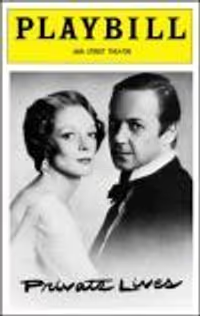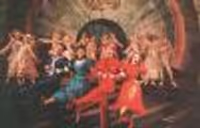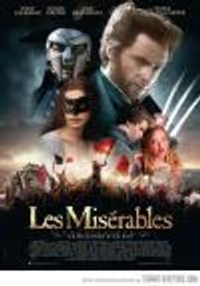Most important Director/Writer collaborations?
Joined: 12/31/69
#1Most important Director/Writer collaborations?
Posted: 10/29/11 at 6:43pm
I've been asked to make a list of the most essential writer/director collaborations in 20th Century theatre (well and post 20th Century...). The issue is directors with who the works wouldn't have existed otherwise or at least would have in a vastly different state--ie they were as important to the creation in their way as the author, and they had to work together over 3+ shows (so Tommy Tune/Maury Yeston or Bennett and his Chorus Line team don't count...)
The obvious two that sprung to mind were
Elia Kazan/Tennessee Williams
and Hal Prince/Stephen Sondheim. (I suppose Lapine/Sondheim have worked enough together to count too, though he being the author it seems a bit different). Can people think of others?
#2Most important Director/Writer collaborations?
Posted: 10/29/11 at 6:58pm
George Abbott/Rodgers & Hart
ETA to fix typo
Updated On: 10/29/11 at 06:58 PM
Gaveston2
Broadway Legend Joined: 6/28/11
#2Most important Director/Writer collaborations?
Posted: 10/29/11 at 7:04pm
And George Abbott (with Bob Fosse as choreographer) with Adler & Ross.
It's not their fault that Ross died before they could do a third show.
Broadway Legend Joined: 12/31/69
#3Most important Director/Writer collaborations?
Posted: 10/29/11 at 7:27pm
Always forget how much Abbott did of R&H.
When Trevor nunn directs does he affect the writing much? I always get the impression the only major director ALW has let help shape his show was when Prince made him rewrite chunks of Evita.
Bernstein and Robbins worked closely together--and helped shape the dances together for both On the Town and WSS though Robbins didn't direct OTT (back to Abbott), and Robbins was only a show doctor on Wonderful Town...
Kander and Ebb and Hal Prince? Prince seemed very much a part of the way Cabaret and Zorba ended up--and I believe they were actually his ideas (though both, like the Sondheim shows, had different librettists), and he helped reshape Kiss of the Spider Woman after its infamous original workshop.
Broadway Legend Joined: 12/31/69
#4Most important Director/Writer collaborations?
Posted: 10/29/11 at 7:30pmI suppose Kazan and Arthur Miller were almost as important a collab as Kazan and Williams, as well. All My Sons, Death of a Salesman (which Kazan helped shape), as well as After the Fall (I don't know much about Miller's less famous plays, so am not sure if they collaborated elsewhere).
TheHappyPhantom
Featured Actor Joined: 8/25/11
#5Most important Director/Writer collaborations?
Posted: 10/29/11 at 7:51pmDefinitely Sondheim/Lapine or Prince.
#6Most important Director/Writer collaborations?
Posted: 10/29/11 at 8:27pmArthur Laurents / Arthur Laurents
Broadway Legend Joined: 12/31/69
#8Most important Director/Writer collaborations?
Posted: 10/30/11 at 1:38pm
Chekhov and Stanislavski
Gorky and Stanislavski
Wilson and Richards
Pinter and Hall
Hammerstein and Mamoulian
Frayn and Blakemore
Odets and Clurman
#9Most important Director/Writer collaborations?
Posted: 10/30/11 at 1:57pmSince we can't begin to guess how a different director would have affected a piece, isn't this kind of impossible to answer? It's rather a road not taken kind of list, yes?
#10Most important Director/Writer collaborations?
Posted: 10/30/11 at 4:13pmI'm not sure about that, dramamama. Seems like Eric's list is to identify important lasting collaborations. The question of whether or not some other director could have realized the writer's work equally well or even better is a different one. Perhaps a mystery worth noting if Eric's providing an introduction. Then again, perhaps not.
#11Most important Director/Writer collaborations?
Posted: 10/30/11 at 4:20pmSusan Stroman and Mel Brooks..... groan!
#12Most important Director/Writer collaborations?
Posted: 10/30/11 at 6:04pm
I would say Prince/Sondheim is definitely more significant than Lapine/Sondheim, though the latter is still very important. Prince/Sondheim did Company, Follies, A Little Night Music, Pacific Overtures, Sweeney Todd, Merrily We Roll Along, Road Show. Prince was the reason why Company and Pacific Overtures were musicals in the first place and the reason why they happened. He also re-structured and re-shaped Follies from its previous incarnation, The Girls Upstairs. The first 6 they did together were at the peak of Sondheim's career and Prince was one of the biggest reasons for Sondheim's success with those shows. Prince also produced West Side Story, Forum, and Side By Side By Sondheim.
Lapine/Sondheim have done Sunday, Woods, Passion, Sondheim on Sondheim, and the LA/Encores revivals of Merrily We Roll Along. But Sunday was so bold and important and it won the Pulitzer. It also proved to Sondheim that a director could direct his own book.
I would also agree that Stroman REALLY made "The Producers" what it was (moreso than Thomas Meehan) because Mel Brooks had never done any Broadway shows before. She structured it, ripped it apart, and I think essentially ghost-wrote many parts of it (in the way that Prince did with many of Sondheim's shows). While on the subject of collaborators, Glen Kelly essentially wrote everything that wasn't a single-voice melody.
Updated On: 10/30/11 at 06:04 PM
#13Most important Director/Writer collaborations?
Posted: 10/30/11 at 6:08pmJerome Robbins & Bernstein/Laurents/Sondheim
Gaveston2
Broadway Legend Joined: 6/28/11
#14Most important Director/Writer collaborations?
Posted: 10/30/11 at 6:14pm
Prince "ghost wrote" parts of the shows he did with Sondheim?
There's no question that Prince was the "muscle" on most of those shows and his leadership was key. And Sondheim describes writing songs based on improvisations that Prince allowed the actors to do in rehearsal. (See "Weekend in the Country," for example.)
But Prince "ghost wrote"? I assume you mean the books, because I've never heard any claim that Prince wrote Sondheim's lyrics (nor do Prince's non-Sondheim shows suggest Prince has the talent.)
How do we know Prince "ghost wrote" anything?
#15Most important Director/Writer collaborations?
Posted: 10/30/11 at 7:10pmI meant the books, not Sondheim's material...Gost-wrote probably is the wrong term, but he certainly had a big say in the flow and structure of the show and even in which songs stayed and went.
Gaveston2
Broadway Legend Joined: 6/28/11
#16Most important Director/Writer collaborations?
Posted: 10/30/11 at 7:18pm
I see, Sondheim Fan, and I'm sure you're right. Sondheim gives Prince a great deal of credit for the shows they did together.
But one of Prince's musical directors told me when I was a young, starry-eyed Prince fan that Prince's true talent lay in choosing the best collaborators. (This became all too apparent when Michael Bennett left the "team" and went out on his own.)
So I think "ghost wrote" is too strong. On the other hand and IMO, it's quite fair to say Prince brought out the best in Sondheim, Kander & Ebb, and countless other artists.
Broadway Legend Joined: 12/31/69
#17Most important Director/Writer collaborations?
Posted: 10/30/11 at 7:28pm
Robbins and Bernstein/Sondheim/Laurents wouldn't make my list cuz they had one show. :P Bernstein and Robbins did have a more lasting collaboration, but--my point was three or more shows, but that's pedantic, I suppose it doesn't matter (Mamoulian and Hammerstein is a good choice, but didn't he just do two of his shows--or is there a non Rodgers, Hammerstein shoiw I'm forgetting?)
As for Dramamama, that's fair enough I guess, though I don't really understand why it's an any less worthy topic to point out than anything else discussed here. I guess what I was looking for is shows where the director was almost, if not as much or more, important to the creation of the final piece as the author(s).
Hal Prince's work with Sondheim, and Kander and Ebb often came from concepts or properties that he picked and brought to the authors. If that wasn't the case, he often helped radically reshape them--at any rate he was a part of the creation process in a more lasting way than many directors are.
Similarly with Tennessee Williams, while Kazan made less textual contributions to Streetcar Named Desire, the three later plays were vastly reshaped in the writing process by Williams' work with Kazan (in fact Kazan also helped reshape and revise The Rose Tattoo and Orpheus Descending as well, just one of many reasons why Williams was so hurt and offended when Kazan then failed to direct them on stage). With Kazan and Williams the partnership also often included Jo Mielziner who was brought into the project early on, the way Hal Prince often did with Boris Aronson.
Robbins obviously did a lot of this in his later shows as well--as did people like Fossee (Sweet Charity, and Chicago being his initial concepts for musical adaptation), and Bennett, as well as many others. But they tended to work with different teams.
I find it interesting just because it raises questions--like, could it be argued that the success of these shows had as much to do with the staging as the "written" (score and dialogue) parts? And is the director's work (and perhaps choreographer, designer, depending on the show) as important to the creation of the piece. Those things often get ignored because they're harder to discuss and weigh (unlike in film where the director's work is often seen as THE most important element, and of course the film can be re viewed over and over to try to see why).
...if that makes sense... Hrmm
Broadway Legend Joined: 12/31/69
#18Most important Director/Writer collaborations?
Posted: 10/30/11 at 7:29pmI guess my basic point is we wouldn't have Cabaret, or Follies or Cat On a Hot Tin Roof in anything close to the way we have them now if it weren't for the directors--if at all.
Broadway Legend Joined: 12/31/69
#19Most important Director/Writer collaborations?
Posted: 10/30/11 at 7:30pm
Ugh pressed send too soon.
And with many shows--thena nd now, that isn't nearly as true--we would have the play/musical in a fairly similar state no matter who ended up directing it, though perhaps it wouldn't have been as big a success.
#20Most important Director/Writer collaborations?
Posted: 10/30/11 at 7:34pm
I wasn't trying to be difficult, and I've enjoyed reading the responses and opinions. I guess I always look at things with a nod to the unknown. And I do wonder about the "what if".
Sure, some of the things you mention might not have happened -- but what if with a different slant they were better? Or just different: we still wouldn't know what we were missing.
Broadway Legend Joined: 12/31/69
#21Most important Director/Writer collaborations?
Posted: 10/30/11 at 7:35pm
"But one of Prince's musical directors told me when I was a young, starry-eyed Prince fan that Prince's true talent lay in choosing the best collaborators. (This became all too apparent when Michael Bennett left the "team" and went out on his own.)
So I think "ghost wrote" is too strong. On the other hand and IMO, it's quite fair to say Prince brought out the best in Sondheim, Kander & Ebb, and countless other artists."
I do definitely agree with this. I know Kazan said, when he finally wrote his own play (whose title I can't even remember--it was a big failure) that he finally realized why he never was a playwright. So I don't mean these directors are authors in the true sense but often they did come up with the initial idea, and they certainly brought out the best in their collaborators partly working as brilliant editors with brilliantly theatrical minds--suggesting that "this kind of scene" was needed here, and allowing it to be written, or reconceiving another idea, etc. With many shows, and many directors, this role simply isn't done by the director (nor does it have to be, I guess I'm trying to get at collaboration teams where the director was as vital to the creation fo the work as any author).
I used to kinda scoff at how the 70s Sondheim shows were called the Prince/Sondheim shows. But I'm much more prone to agree with it now--a good chunk of them simply wouldn't exist without him, or if they did (Follies being the obvious example) would have been vastly, vastly different.
Broadway Legend Joined: 12/31/69
#22Most important Director/Writer collaborations?
Posted: 10/30/11 at 7:37pm
Dramamama, sorry, my reply does make it sound like I read your view as an attack. You weren't being difficult, I guess I just thought my point wasn't clear.
You're completely right--and I love to speculate obviously--some of these shows very well could have been better with a different collaborator. That said, many like Cabaret, etc, probably simply wouldn't exist whatsoever.
Gaveston2
Broadway Legend Joined: 6/28/11
#23Most important Director/Writer collaborations?
Posted: 10/30/11 at 7:39pm
Eric, I think you miss some really important directors with your requirement that the collaboration with writers last through three shows. Directors such as Jerome Robbins and Gower Champion (as well as Prince) were known to be commanding creative forces--whether or not they worked with the same writers for three shows.
In fact, one might even argue that the way to increase your power as a director is to continually work with new writers so that the authors never get too powerful. (Obviously, Prince and Kazan and Robbins were confident enough to ignore this principle.)
Broadway Legend Joined: 12/31/69
#24Most important Director/Writer collaborations?
Posted: 10/30/11 at 7:45pm
Oh I obviously, obviously do. That wasn't the point of my original post--I was wondering if there were other examples of prolonged collaborations with the director workign this way with (at lewast one) of the creators/authors. It's kind abranched out into a different question--and there are dozens more shows that fit this theme if one includes teams that worked together for one or two shows--I was just wondering if peopel could think of more longer lasting team ups is all.
Obviously people like Fosse, Bennett, etc etc (Tommy Tune? George C Wolfe?) would have to be added then.
Videos








